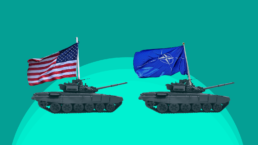Democracy Now! guests Anatol Lieven and William Hartung discuss tensions in Eastern Europe.
By Amy Goodman & Juan González, DemocracyNow!
The U.S. has prepared some 8,500 troops to deploy to Eastern Europe in the event that Russia invades Ukraine, which Russian President Vladimir Putin denies is his goal. On Wednesday, officials from Russia, Ukraine, France and Germany are scheduled to meet in Paris to negotiate resolving the crisis. “The security of Europe ought to be principally Europe’s business,” says Anatol Lieven, senior fellow at the Quincy Institute for Responsible Statecraft. “This whole notion of great power competition, which is embedded in the National Defense Strategy, has been used as kind of the magic key to keep Pentagon spending at near-records levels,” says national security expert William Hartung, research fellow at the Quincy Institute.

Transcript
AMY GOODMAN: The Pentagon has placed 8,500 troops — up from 5,000 — on heightened alert to potentially deploy to Eastern Europe over concerns Russia may soon invade Ukraine. The U.S. and NATO allies have accused Russia of amassing 100,000 troops near the Ukrainian border, but Russia is denying it’s planning an invasion. Pentagon Press Secretary John Kirby spoke Monday.
JOHN KIRBY: Secretary Austin has placed a range of units in the United States on a heightened preparedness to deploy, which increases our readiness to provide forces if NATO should activate the NRF or if other situations develop. All told, the number of forces that the secretary has placed on heightened alert comes up to about 8,500 personnel. … But again, no mission has been assigned to these troops; no deployment orders have been sent to them. What the secretary has ordered them to do is to be ready to go in some cases on a much shorter tether than what they had before.
AMY GOODMAN: This comes as other NATO nations are planning to send additional troops, ships and fighter jets to Eastern Europe. Plans call for France to send troops to Romania, Denmark to send F-16 jets to Lithuania, and for the Netherlands to send F-35 jets to Bulgaria. Last week, the Biden administration gave Lithuania, Latvia and Estonia approval to send U.S.-made weapons to Ukraine. On Monday, the Kremlin accused the United States and NATO of escalating tension in the region.
DMITRY PESKOV: [translated] We are seeing statements from the North Atlantic Alliance about more troops, pulling forces and assets into the eastern flank. All of it is causing tensions to rise. I’d like to point out it is not because of what we, Russia, are doing; it’s all happening because of what NATO, the United States are doing and the information they are spreading.
Recent Posts
The Rage Of Billionaires And The Frenzy To Stop Zohran Mamdani From Becoming New York’s Mayor
June 30, 2025
Take Action Now The constellation of forces now regrouping with a vengeance includes titans of Wall Street, enormous real estate interests,…
It’s Not Just The Cities. Extreme Heat Is A Growing Threat To Rural America.
June 28, 2025
Take Action Now The urban heat island sits in a rural heat ocean.By Umair Irfan, Vox Summer has officially begun with a blast of scorching…
Mamdani’s Massive Victory Should Show Democrats Where The Party’s Future Lies
June 27, 2025
Take Action Now NYC mayoral candidate Zohran Mamdani has thrown the drowning Democratic Party a life vest. Will its leaders use it?By Sam…
India Walton’s Advice For Zohran Mamdani
June 26, 2025
Take Action Now “I think that for him, the race ’til November needs to be staying on message—we can’t start to water it down…




